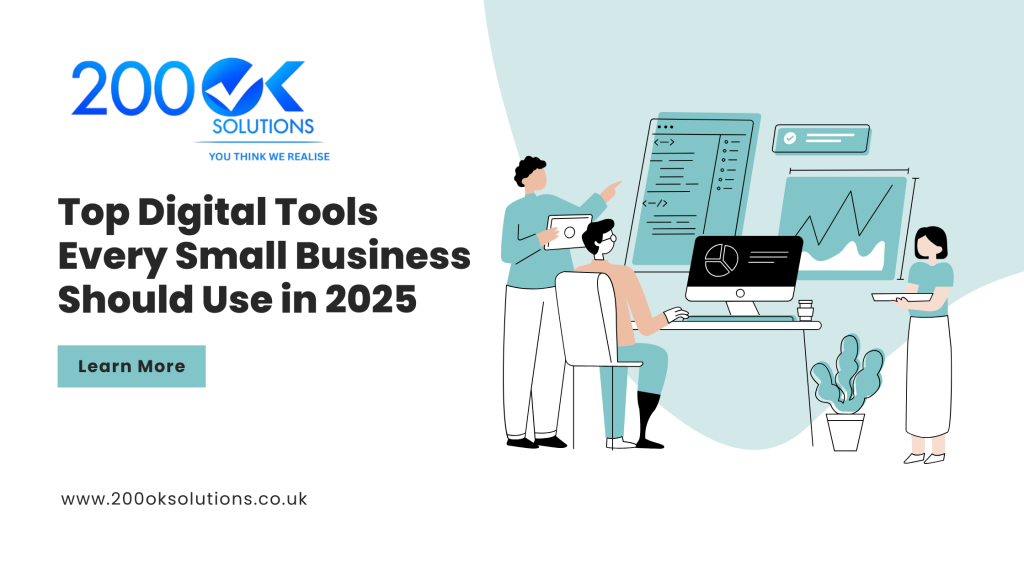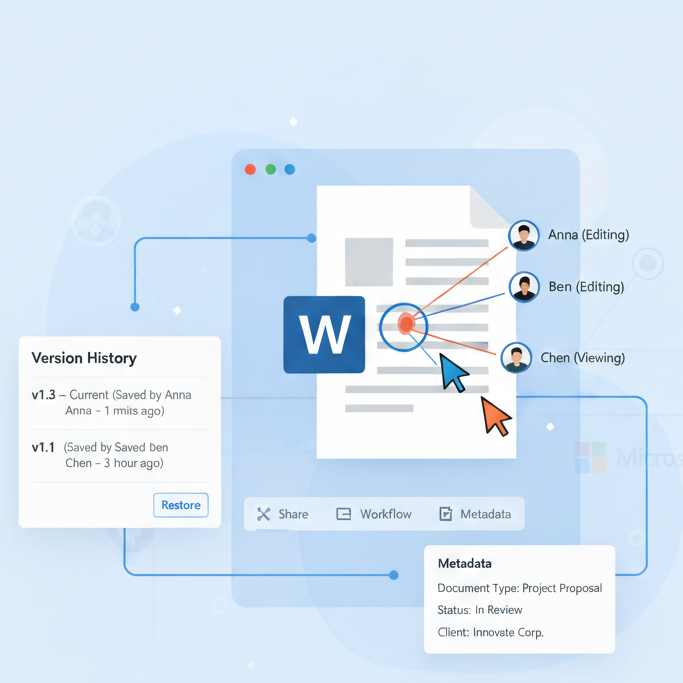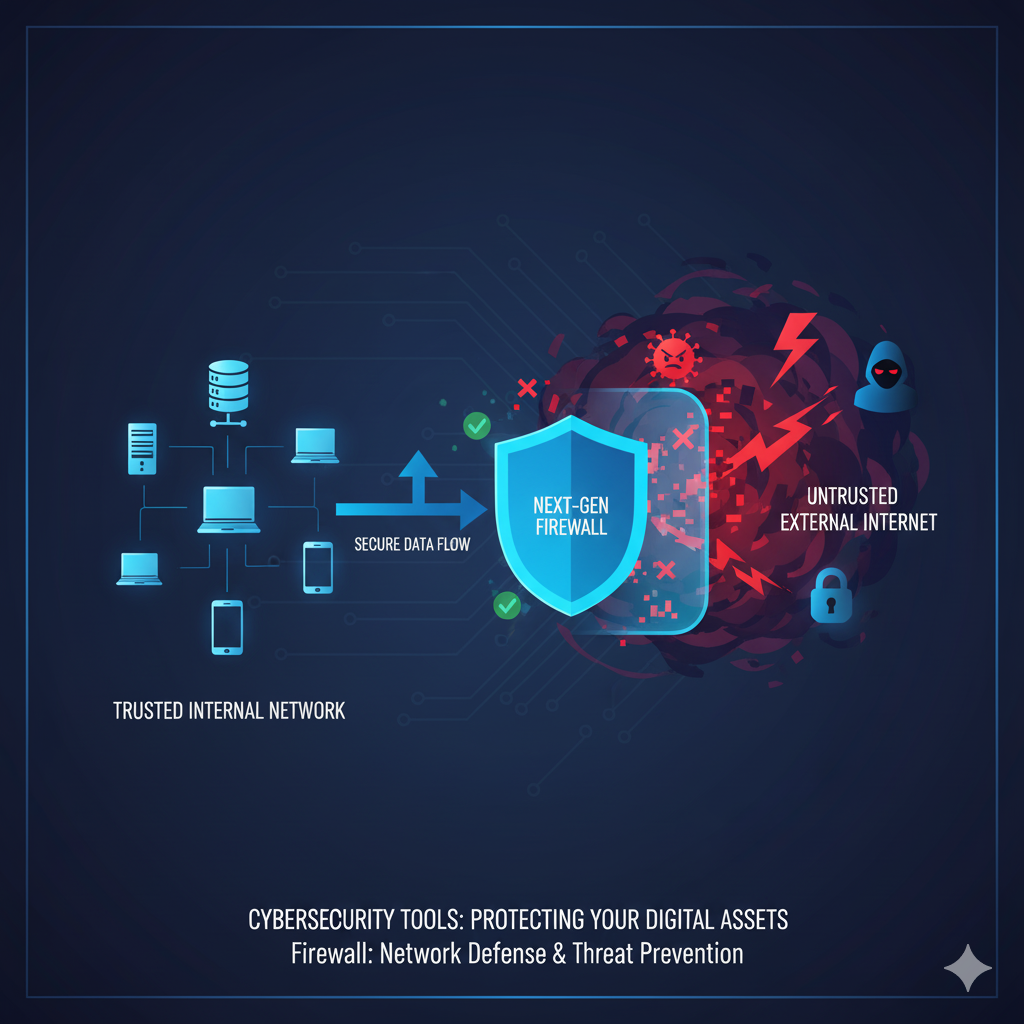
Small businesses in 2025 face a paradoxical challenge: they must compete with enterprise-level competitors while operating with limited budgets and smaller teams. The great equalizer? Strategic adoption of the right digital tools. Today’s cloud-based solutions, AI-powered platforms, and integrated business systems enable small businesses to punch well above their weight class, delivering enterprise-quality experiences without enterprise-level costs.
As a technology partner to businesses across the UK and India for over 13 years, 200OK Solutions has helped countless small businesses identify, implement, and maximize the value of digital tools. This comprehensive guide explores the essential digital tools every small business should leverage in 2025, covering everything from cloud infrastructure and custom applications to AI-powered automation and collaborative platforms.
The Digital Transformation Imperative for Small Businesses
Before diving into specific tools, it’s crucial to understand why digital transformation is no longer optional for small businesses. Your customers expect seamless digital experiences whether they’re engaging with Fortune 500 companies or local businesses. They expect mobile-friendly websites, instant communication, online transactions, and personalized service. Meeting these expectations requires the right digital infrastructure.
Moreover, operational efficiency directly impacts profitability for small businesses. When you’re working with lean teams, every hour spent on manual, repetitive tasks represents a significant opportunity cost. Digital tools automate routine operations, freeing your team to focus on growth-driving activities like customer acquisition, product development, and strategic planning.
The good news? Cloud computing and software-as-a-service models have democratized access to powerful technology. Tools that once required six-figure investments and dedicated IT departments are now available on subscription models affordable for businesses of any size. The key is knowing which tools deliver the greatest return on investment for your specific needs.
Cloud Infrastructure: The Foundation of Modern Business
Every digital tool recommendation begins with cloud infrastructure. The days of maintaining on-premises servers, worrying about hardware failures, and manually managing backups are over for small businesses. Cloud platforms provide enterprise-grade infrastructure accessible through simple web interfaces and affordable pay-as-you-go pricing.
Amazon Web Services (AWS): The Comprehensive Cloud Platform
AWS remains the dominant cloud platform for good reason. It offers an unmatched breadth of services covering every conceivable business need. For small businesses, AWS provides several compelling advantages that make it an essential tool in 2025.
Scalability Without Capital Investment: AWS enables small businesses to start small and scale seamlessly. Launch a website on a single server, and as traffic grows, AWS automatically scales to handle millions of visitors without you purchasing additional hardware. This elasticity means you pay only for resources you actually use, making AWS incredibly cost-effective for businesses with variable demands.
Robust Security Infrastructure: Small businesses often lack dedicated security teams, making them attractive targets for cyberattacks. AWS provides enterprise-grade security features including automatic encryption, network isolation, threat detection, and compliance certifications. These security capabilities would be prohibitively expensive to implement independently but come standard with AWS services.
AI and Machine Learning Services: AWS offers pre-built AI services that small businesses can implement without data science expertise. Amazon Rekognition provides image and video analysis. Amazon Comprehend extracts insights from text. Amazon Forecast generates accurate demand predictions. These AI capabilities enable small businesses to implement sophisticated intelligence that was previously accessible only to large enterprises.
Global Reach: AWS operates data centers across the globe, enabling small businesses to serve customers internationally with low latency. Your application can run simultaneously in multiple regions, providing fast, reliable access to users regardless of their location.
At 200OK Solutions, our AWS expertise enables us to architect cost-effective cloud solutions tailored to small business needs. We help clients leverage AWS services for hosting websites and applications, storing and analyzing data, automating business processes, implementing AI capabilities, and ensuring disaster recovery and business continuity. Our approach focuses on maximizing value while controlling costs—critical for small business budgets.
Microsoft Azure: The Productivity Cloud
Microsoft Azure provides another comprehensive cloud platform with particular strengths for businesses already invested in Microsoft’s ecosystem. If your team uses Office 365, Dynamics 365, or Windows, Azure offers seamless integration that enhances productivity.
Hybrid Cloud Capabilities: Azure excels at hybrid cloud scenarios where some resources remain on-premises while others move to the cloud. This flexibility helps small businesses transition gradually to cloud infrastructure without requiring immediate, disruptive overhauls.

Active Directory Integration: For businesses managing user authentication and permissions, Azure Active Directory provides centralized identity management integrated with Microsoft 365 and thousands of third-party applications. Employees use single sign-on to access all business tools, improving both security and user experience.
Azure AI and Cognitive Services: Like AWS, Azure offers pre-built AI services covering computer vision, natural language processing, speech recognition, and decision-making. Azure Bot Service enables small businesses to implement intelligent chatbots for customer service. Azure Machine Learning Studio provides a visual interface for building custom AI models without extensive coding.
Cost Management Tools: Azure provides sophisticated cost analysis and budgeting tools that help small businesses monitor and optimize cloud spending. Automated recommendations identify opportunities to reduce costs through reserved instances, right-sizing resources, or eliminating unused services.
200OK Solutions leverages Azure particularly for businesses seeking tight integration with Microsoft products. We implement Azure-based solutions for cloud hosting and infrastructure, business intelligence and analytics, identity and access management, backup and disaster recovery, and DevOps automation.
Google Cloud Platform (GCP): Data and AI Excellence
Google Cloud Platform brings Google’s expertise in data processing, analytics, and artificial intelligence to businesses of all sizes. While GCP has a smaller market share than AWS or Azure, it offers unique strengths that make it compelling for specific use cases.
BigQuery for Analytics: Small businesses generate more data than ever from websites, applications, customer interactions, and operations. BigQuery provides serverless data analytics capable of processing billions of rows in seconds. This power enables data-driven decision making previously accessible only to large enterprises with expensive data warehousing infrastructure.
Google Workspace Integration: GCP integrates seamlessly with Google Workspace (Gmail, Drive, Docs, Sheets, Meet), which many small businesses already use. This integration enables powerful workflow automation and data synchronization between productivity tools and business applications.
TensorFlow and AI Platform: For businesses seeking to implement custom machine learning models, GCP provides TensorFlow and AI Platform with extensive tools and pre-trained models. Google’s leadership in AI research translates into cutting-edge capabilities accessible through GCP.
Competitive Pricing: GCP often offers lower pricing than competitors, particularly for data storage and compute-intensive workloads. Sustained use discounts automatically reduce costs as usage increases, benefiting small businesses with consistent workloads.
At 200OK Solutions, we help small businesses select the cloud platform best aligned with their specific needs, budget, and existing technology investments. Often, a multi-cloud strategy leveraging strengths of different platforms delivers optimal results.
Custom Web Applications: Your Digital Storefront
In 2025, your website isn’t just a digital brochure—it’s your primary business tool for attracting customers, processing transactions, delivering services, and building relationships. Off-the-shelf website builders have their place, but custom web applications provide capabilities and flexibility that differentiate your business.
Responsive, Mobile-First Design
Over 60% of web traffic now comes from mobile devices, making mobile optimization non-negotiable. Custom web applications built with modern frameworks ensure seamless experiences across devices, automatically adapting layout and functionality to screen sizes from smartphones to desktop monitors.
Responsive design isn’t just about appearance—it impacts conversion rates directly. Studies show that users abandon websites that don’t load quickly or function well on mobile devices. Custom web applications optimized for performance deliver fast, smooth experiences that keep visitors engaged and converting into customers.
Progressive Web Apps (PWAs)
Progressive Web Apps represent a powerful evolution in web technology, combining the best attributes of websites and mobile apps. PWAs work offline, send push notifications, and install on users’ devices like native apps, yet they’re built with web technologies and don’t require app store approval or distribution.
For small businesses, PWAs offer significant advantages. They provide app-like experiences without the cost of developing separate iOS and Android applications. They work across all devices with a single codebase. They’re discoverable through search engines unlike native apps. They update automatically without users downloading updates.
At 200OK Solutions, we specialize in developing custom web applications using modern technology stacks including .NET, Java, PHP, and JavaScript frameworks like React, Angular, and Vue.js. Our full-stack development expertise enables us to build sophisticated applications that handle everything from complex business logic to real-time data processing and AI integration.
E-Commerce Capabilities
For product-based businesses, e-commerce functionality is essential. While platforms like Shopify and WooCommerce serve many businesses well, custom e-commerce applications provide advantages for businesses with unique requirements—complex product configurations, custom pricing logic, integration with specialized inventory systems, or unique checkout workflows.
Custom e-commerce development enables you to optimize every aspect of the customer journey for your specific products and target audience. Integration with payment gateways, shipping providers, inventory management, and customer relationship management creates a seamless operational workflow that scales with your business.
API Development and Integration
Modern business operations rely on multiple specialized systems working together seamlessly. Your website must integrate with your CRM to track leads, your accounting software to manage finances, your email marketing platform to nurture customers, and potentially dozens of other tools. This integration happens through APIs—Application Programming Interfaces.
200OK Solutions excels at API development and integration, creating custom APIs that enable your systems to communicate efficiently. We build RESTful and GraphQL APIs that expose your application’s functionality to other systems, integrate third-party APIs to leverage external services and data, develop API gateways that manage authentication and rate limiting, and implement webhook systems that enable real-time data synchronization.
Proper API architecture ensures that as your business grows and adopts new tools, they integrate smoothly with existing systems rather than creating data silos and manual work.
Mobile Applications: Meeting Customers Where They Are
Smartphones have become the primary computing device for millions of users. Mobile applications enable businesses to deliver experiences optimized for mobile usage patterns and leverage unique mobile capabilities like location services, camera access, push notifications, and offline functionality.
Native vs. Cross-Platform Development
Small businesses face a critical decision: develop native applications separately for iOS and Android, or use cross-platform frameworks that create both apps from a single codebase. Each approach has merits depending on your specific requirements.
Native Development: Building separate native apps for iOS and Android delivers optimal performance and access to the latest platform-specific features. For applications requiring intensive graphics processing, complex animations, or cutting-edge platform features, native development is often the best choice. However, it requires maintaining two codebases and typically costs more.
Cross-Platform Development: Frameworks like React Native, Flutter, and Xamarin enable developers to write code once and deploy to both iOS and Android. This approach reduces development costs and time-to-market while still delivering quality user experiences. For most small business applications—customer apps, field service tools, employee productivity apps—cross-platform development provides an excellent balance of capability and cost-effectiveness.
At 200OK Solutions, we have expertise in both native and cross-platform mobile development. We help clients evaluate their specific requirements, budget, and timeline to select the optimal approach, ensuring they get a mobile solution that serves business objectives without overspending.
Essential Mobile App Features for Small Businesses
Regardless of development approach, certain features have become essential for small business mobile apps in 2025:
Push Notifications: Direct communication with customers through push notifications drives engagement and conversions. Automated notifications about order status, appointment reminders, personalized offers, and new content keep your business top-of-mind.
Offline Functionality: Mobile connectivity isn’t always reliable. Applications that work offline and sync data when connectivity returns provide better user experiences and enable productivity regardless of network conditions.
Location Services: Location-aware features enable businesses to provide contextually relevant experiences—finding nearby stores, offering location-based promotions, or optimizing field service routing.
Mobile Payments: Integrating mobile payment options including Apple Pay, Google Pay, and contactless cards reduces friction in purchase processes and improves conversion rates.
Biometric Authentication: Fingerprint and facial recognition provide secure yet convenient authentication, improving security while enhancing user experience.
AI-Powered Mobile Experiences
Artificial intelligence transforms mobile applications from tools into intelligent assistants. AI capabilities that small businesses should consider include:
Intelligent Chatbots: AI-powered chatbots provide 24/7 customer support, answering common questions, helping users navigate applications, and escalating complex issues to human agents when necessary.
Personalized Recommendations: Machine learning algorithms analyze user behavior to provide personalized product recommendations, content suggestions, and customized experiences that increase engagement and sales.
Visual Search: Computer vision enables users to search by taking photos rather than typing keywords. Retailers can let customers find products by photographing items they like. Service businesses can enable customers to identify problems by photographing issues.
Voice Interfaces: Natural language processing enables voice-controlled interfaces that make applications more accessible and convenient, particularly for hands-free usage scenarios.
Microsoft 365 and SharePoint: Collaboration and Productivity
For small businesses, productivity tools represent the digital workspace where most work happens. While various productivity suites exist, Microsoft 365 (formerly Office 365) combined with SharePoint has emerged as the comprehensive solution for small businesses in 2025.
Microsoft 365: Beyond Office Applications
Microsoft 365 extends far beyond Word, Excel, and PowerPoint. It provides a complete digital workplace platform including:

Microsoft Teams: This collaboration hub integrates chat, video conferencing, file sharing, and application integration. Teams enables small businesses to work effectively whether everyone’s in the office, fully remote, or hybrid. Integration with other Microsoft 365 applications and thousands of third-party tools makes Teams the central hub for daily work.
OneDrive and SharePoint: These services provide secure cloud storage with sophisticated sharing and collaboration capabilities. Multiple users can edit documents simultaneously. Version history enables recovery of previous document versions. Advanced permissions control who accesses sensitive information.
Power Platform: This suite of low-code tools enables small businesses to build custom solutions without extensive development resources. Power Apps creates custom business applications. Power Automate builds automated workflows between systems. Power BI provides business intelligence and data visualization.
Security and Compliance: Microsoft 365 includes enterprise-grade security features—multi-factor authentication, data loss prevention, threat protection, and compliance tools that help small businesses meet regulatory requirements.
SharePoint: Your Business Intranet and Knowledge Management System
SharePoint transforms how small businesses organize information and automate processes. As SharePoint consulting specialists, 200OK Solutions helps small businesses leverage SharePoint’s extensive capabilities:
Document Management: SharePoint provides centralized document storage with advanced features like content types, metadata management, and automated retention policies. Instead of searching through endless email attachments or network folders, teams find information quickly through powerful search functionality.
Custom Business Applications: SharePoint supports custom applications tailored to specific business processes—project management systems, customer databases, inventory tracking, HR portals, and more. These applications integrate seamlessly with other Microsoft 365 tools and can be built using low-code approaches that minimize development costs.
Workflow Automation: SharePoint’s workflow capabilities, particularly when combined with Power Automate, enable businesses to automate routine processes—approval workflows for documents or purchases, onboarding processes for new employees, customer inquiry routing, and much more. These automations reduce manual work and ensure consistent process execution.
Team Sites and Communication Sites: SharePoint sites provide dedicated workspaces for teams, projects, or departments. Teams share documents, track tasks, discuss issues, and coordinate work. Communication sites broadcast information across the organization, replacing traditional intranet functionality.
200OK Solutions specializes in SharePoint development, migration, and consulting. We help small businesses migrate from legacy systems to SharePoint, develop custom SharePoint applications and workflows, integrate SharePoint with other business systems, design intuitive information architecture, and train teams to maximize SharePoint’s value.
Customer Relationship Management: The Heart of Customer-Centric Business
Small businesses thrive or struggle based on customer relationships. CRM systems have evolved from simple contact databases into comprehensive platforms that manage the entire customer lifecycle—from initial contact through sales, service, and ongoing engagement.
Modern CRM Capabilities
Today’s CRM systems powered by cloud platforms and AI provide capabilities that transform how small businesses interact with customers:
360-Degree Customer View: Modern CRMs aggregate information from every customer touchpoint—website visits, email interactions, purchases, support tickets, social media engagement—creating comprehensive customer profiles that inform every interaction.
Sales Pipeline Management: CRMs track leads through sales pipelines, automatically prioritizing high-value opportunities and alerting sales teams to follow-up actions. Visual dashboards show pipeline health, forecast revenue, and identify bottlenecks.
Marketing Automation: Integrated marketing tools enable targeted email campaigns, lead nurturing sequences, and personalized content delivery based on customer behavior and preferences. Marketing automation ensures consistent, timely communication without manual effort.
Customer Service Tools: Service modules provide ticketing systems, knowledge bases, and case management that enable efficient, high-quality customer support. Integration with communication channels (email, chat, phone, social media) ensures no customer inquiry falls through cracks.
AI-Powered Insights: Machine learning analyzes customer data to predict churn risk, recommend next best actions, forecast customer lifetime value, and identify expansion opportunities. These insights enable proactive, strategic customer management.
CRM Integration and Customization
While standalone CRM systems provide significant value, their power multiplies when integrated with other business systems. At 200OK Solutions, we develop custom CRM integrations that connect CRM systems with e-commerce platforms for unified customer and order data, accounting software for financial visibility, marketing platforms for coordinated campaigns, customer support tools for seamless service delivery, and custom business applications for specialized workflows.
We also develop custom CRM extensions and modules that address unique business requirements not met by out-of-the-box functionality, ensuring your CRM adapts to your business processes rather than forcing your business to adapt to the software.
Business Intelligence and Analytics: Data-Driven Decision Making
Small businesses generate enormous amounts of data from websites, applications, transactions, customer interactions, and operations. Without proper tools, this data remains untapped potential. Business intelligence and analytics tools transform raw data into actionable insights that drive better decisions.
Cloud-Based Analytics Platforms
Modern analytics platforms leverage cloud infrastructure to provide powerful capabilities without requiring specialized hardware or expertise:
Amazon QuickSight: AWS’s business intelligence service enables small businesses to create interactive dashboards and visualizations from diverse data sources. Natural language queries allow business users to ask questions in plain English and receive visual answers. Machine learning insights automatically identify trends and anomalies.
Microsoft Power BI: This comprehensive analytics platform integrates seamlessly with Microsoft 365 and connects to hundreds of data sources. Power BI’s intuitive interface enables business users to create sophisticated reports and dashboards. AI-powered features generate insights automatically and enable natural language queries.
Google Data Studio: Free and deeply integrated with Google Analytics and Google Ads, Data Studio provides accessible entry point to business intelligence for small businesses already using Google’s ecosystem.
Implementing Analytics Successfully
Technology alone doesn’t create data-driven cultures. At 200OK Solutions, we help small businesses implement analytics successfully by identifying key performance indicators aligned with business objectives, consolidating data from disparate sources into unified views, designing intuitive dashboards that highlight actionable insights, establishing regular reporting cadences that inform decision-making, and training teams to interpret data and take appropriate actions.
The goal isn’t generating more reports—it’s enabling better decisions through accessible, relevant insights.
Artificial Intelligence Tools: Intelligence Accessible to All
Artificial intelligence has transitioned from science fiction to practical business tool. In 2025, AI capabilities that seemed futuristic years ago are accessible to small businesses through cloud platforms and specialized services.
AI-Powered Customer Service
Customer service represents an area where AI delivers immediate, tangible value for small businesses:
Intelligent Chatbots: Modern chatbots powered by natural language processing understand customer questions and provide accurate answers conversationally. They handle routine inquiries 24/7, freeing human agents for complex issues requiring empathy and judgment. Advanced chatbots learn continuously, improving responses based on interactions.
Sentiment Analysis: AI analyzes customer communications—support tickets, social media mentions, reviews—to gauge sentiment and identify dissatisfaction early. This early warning system enables proactive intervention before small problems escalate.
Automated Response Generation: AI assists customer service agents by suggesting responses based on ticket content and similar previous interactions. This assistance speeds response times and ensures consistency while maintaining human oversight.
AI for Marketing and Sales
AI transforms marketing and sales effectiveness through:
Predictive Lead Scoring: Machine learning models analyze prospect characteristics and behaviors to predict conversion likelihood, enabling sales teams to prioritize efforts on highest-value opportunities.
Content Personalization: AI personalizes website content, email messaging, and product recommendations based on individual user preferences and behavior patterns, increasing engagement and conversion rates.
Automated Content Creation: AI tools assist in creating marketing content—generating product descriptions, drafting email subject lines, suggesting social media posts. While human review remains important, AI dramatically accelerates content production.
Conversational AI for Sales: AI-powered sales assistants engage website visitors, qualify leads through natural conversation, and schedule meetings with sales representatives, capturing opportunities that would otherwise be missed.
AI-Enhanced Business Operations
Beyond customer-facing applications, AI optimizes internal operations:
Intelligent Document Processing: AI extracts information from documents—invoices, contracts, forms—automatically, eliminating manual data entry. This capability is particularly valuable for businesses processing high volumes of paperwork.
Demand Forecasting: Machine learning models analyze historical data and external factors to predict future demand, enabling better inventory management and resource planning.
Process Optimization: AI identifies inefficiencies in business processes by analyzing workflow data, suggesting improvements that reduce costs and completion times.
At 200OK Solutions, we help small businesses implement AI strategically, focusing on applications that deliver clear ROI rather than chasing AI for its own sake. Our approach identifies high-impact opportunities, implements solutions using appropriate AI services from AWS, Azure, or GCP, ensures proper data quality and governance, monitors performance and tunes models, and trains teams to work effectively with AI systems.
Cybersecurity Tools: Protecting Your Digital Assets
Small businesses face increasing cybersecurity threats. Many attackers specifically target small businesses, assuming they lack sophisticated security measures. Essential cybersecurity tools for 2025 include:

Cloud-Native Security Services
Major cloud platforms provide comprehensive security tools:
AWS Security Services: AWS Shield provides DDoS protection. AWS WAF (Web Application Firewall) protects web applications from common exploits. Amazon GuardDuty provides intelligent threat detection. AWS Security Hub aggregates security alerts across services.
Azure Security Center: This unified security management system provides visibility across cloud and on-premises resources, identifying vulnerabilities and recommending remediation. Azure Sentinel provides AI-powered security information and event management (SIEM).
Google Cloud Security Command Center: Provides centralized visibility and control over security across Google Cloud resources, identifying misconfigurations, vulnerabilities, and threats.
Identity and Access Management
Controlling who accesses what represents a fundamental security requirement:
Multi-Factor Authentication (MFA): Requiring multiple forms of authentication dramatically reduces credential-based attacks. Modern MFA solutions balance security and convenience through mobile apps, biometrics, and hardware keys.
Single Sign-On (SSO): Centralized identity management through Azure Active Directory, Okta, or similar services reduces password fatigue while improving security and providing better visibility into access patterns.
Privileged Access Management: Special controls for accounts with administrative privileges prevent credential theft from resulting in complete system compromise.
Security Monitoring and Incident Response
Proactive monitoring detects threats before they cause damage:
Security Information and Event Management (SIEM): Cloud-based SIEM solutions aggregate logs from all systems, using AI to identify suspicious patterns that might indicate security incidents.
Automated Threat Response: When threats are detected, automated systems can take immediate protective actions—blocking suspicious IP addresses, isolating compromised systems, or requiring additional authentication.
200OK Solutions implements comprehensive security architectures for small businesses, balancing robust protection with usability and cost-effectiveness. Our security implementations ensure your digital assets remain protected without impeding business operations.
DevOps and Application Management Tools
For small businesses developing custom software or managing complex applications, DevOps tools streamline development and operations:
Continuous Integration/Continuous Deployment (CI/CD)
CI/CD pipelines automate the process of building, testing, and deploying code:
GitHub Actions, GitLab CI, or Azure DevOps provide automation frameworks that test code automatically when developers commit changes, build application artifacts, deploy to testing environments, run automated tests, and deploy to production upon approval.
This automation reduces deployment time from days to minutes while improving reliability through consistent, repeatable processes.
Infrastructure as Code
Tools like AWS CloudFormation, Azure Resource Manager, Terraform, and Ansible enable infrastructure management through code rather than manual configuration. This approach ensures consistency, enables version control of infrastructure, facilitates disaster recovery, and accelerates environment provisioning.
Application Performance Monitoring
Tools like AWS CloudWatch, Azure Application Insights, Google Cloud Monitoring, and New Relic provide visibility into application performance, user experience, error rates, and resource utilization. Proactive monitoring identifies issues before users are significantly impacted.
Implementing Your Digital Tool Stack
Understanding which tools are valuable is only the first step. Successful implementation requires strategic planning:
Assess Your Current State and Requirements
Begin by documenting current processes, identifying pain points, understanding where manual work consumes excessive time, recognizing where customer experience falls short, and evaluating existing technology investments.
This assessment reveals priorities and helps avoid implementing tools that don’t address actual needs.
Plan for Integration
The power of digital tools multiplies when they work together seamlessly. Consider how each tool integrates with others in your stack. API availability, pre-built connectors, and data flow between systems are critical considerations.
At 200OK Solutions, we excel at creating integrated technology ecosystems where tools work together coherently rather than creating disconnected silos.
Prioritize User Adoption
The best tools fail if teams don’t adopt them. Successful implementation includes comprehensive training, clear documentation, identifying champions who advocate for new tools, gradual rollout rather than disruptive switchovers, and ongoing support as teams adapt.
Start Small, Scale Gradually
Rather than attempting complete digital transformation simultaneously, begin with high-impact opportunities that build momentum. Quick wins demonstrate value and secure buy-in for broader initiatives.
Partner with Experienced Technology Consultants
Navigating the complex landscape of digital tools, especially when implementing custom solutions or integrating multiple systems, benefits enormously from experienced guidance. At 200OK Solutions, our 13+ years helping businesses implement technology solutions ensures you avoid costly mistakes and maximize value from your technology investments.
Our comprehensive service portfolio—spanning custom application development, mobile apps, cloud services (AWS, Azure, GCP), SharePoint, API development, and IT staff augmentation—enables us to serve as your complete technology partner, guiding strategic decisions and implementing solutions across your entire digital tool stack.
Conclusion: Building Your Competitive Digital Foundation
The digital tools landscape in 2025 offers unprecedented opportunity for small businesses. Cloud platforms democratize access to enterprise-grade infrastructure. AI services provide intelligence previously accessible only to large corporations. Integrated business systems automate routine work and deliver insights that inform strategic decisions. Mobile applications meet customers where they are. Collaboration platforms enable productive work regardless of location.
The small businesses that thrive in 2025 and beyond will be those that strategically adopt digital tools aligned with their specific objectives, challenges, and opportunities. This adoption isn’t about implementing every available tool—it’s about building a coherent technology stack that amplifies your team’s capabilities, enhances customer experiences, and positions your business for sustainable growth.
Whether you’re just beginning your digital transformation journey or looking to optimize existing technology investments, the key is having a clear vision of how technology serves your business strategy, coupled with expert implementation that delivers reliable results.
At 200OK Solutions, we’re passionate about helping small businesses leverage technology effectively. Our expertise across cloud platforms (AWS, Azure, GCP), custom development, mobile applications, AI implementation, and business system integration enables us to design and implement complete solutions tailored to your needs and budget.
With offices in the UK and India, we provide cost-effective solutions without compromising quality or innovation. Our track record of successful implementations across diverse industries ensures you benefit from proven approaches adapted to your unique circumstances.
Ready to build your competitive digital foundation? Contact 200OK Solutions at info@200oksolutions.com to discuss how we can help you select, implement, and maximize value from the right digital tools for your business. Let’s transform your digital capabilities together and position your business for success in 2025 and beyond.

